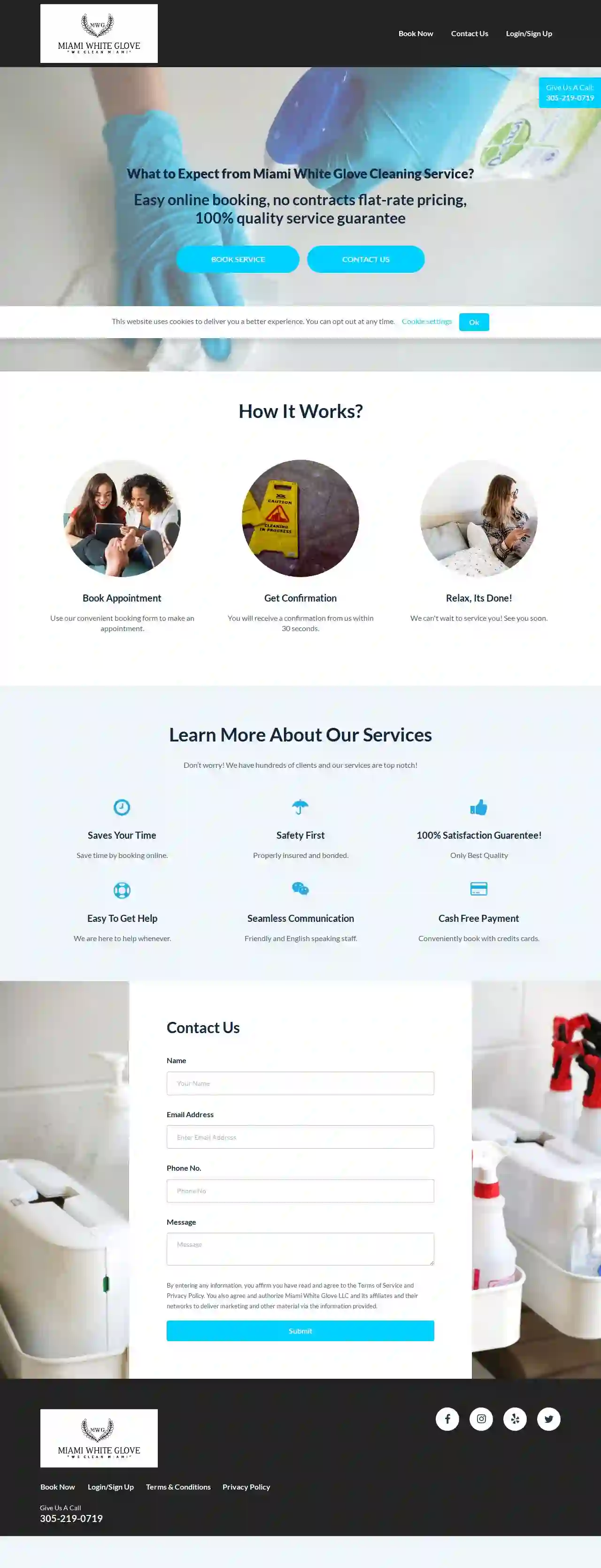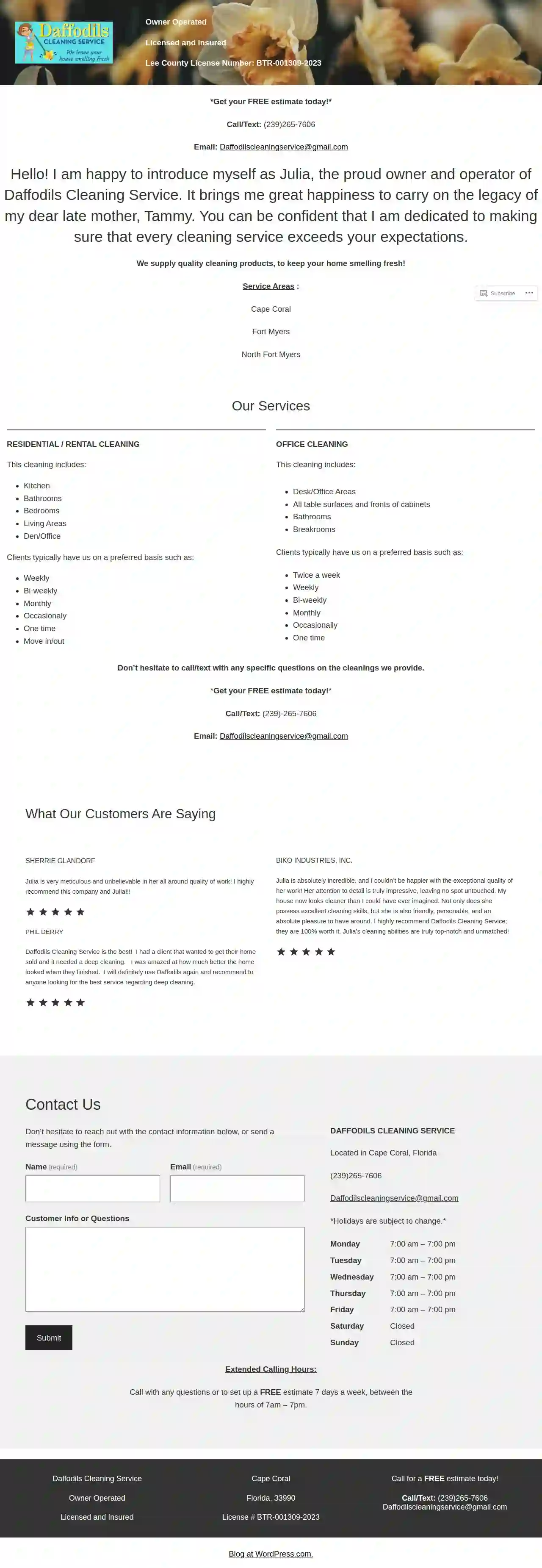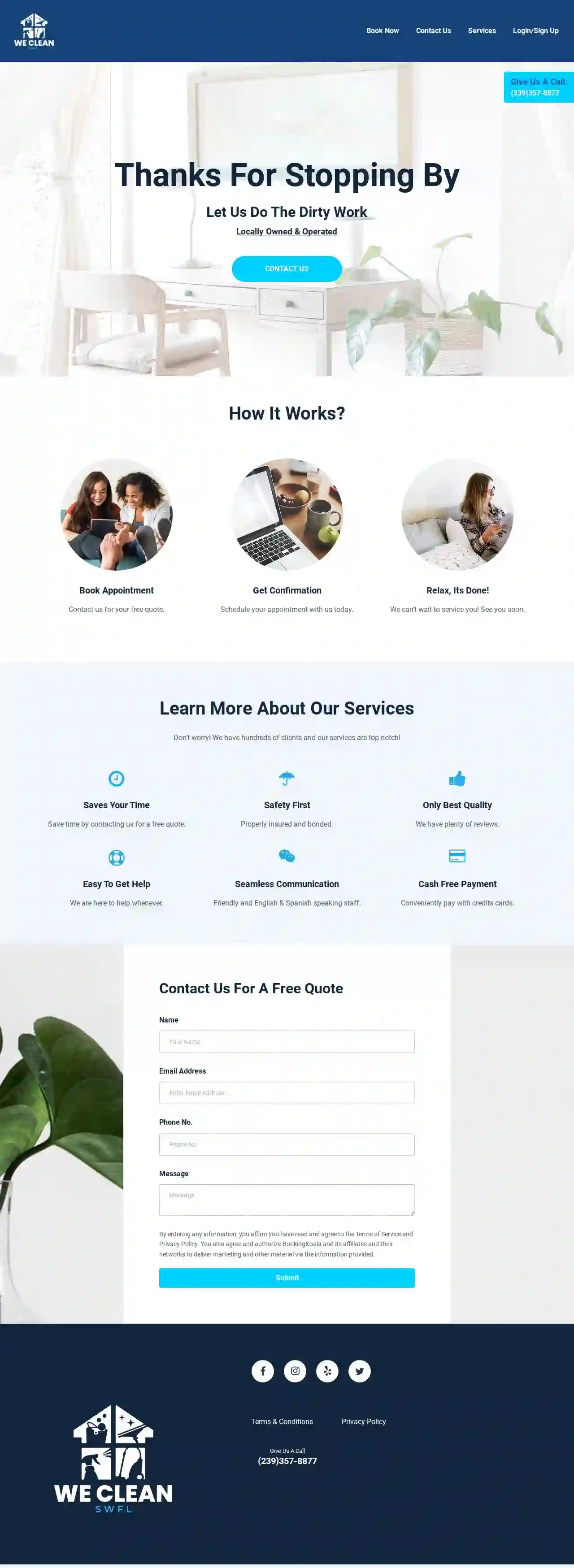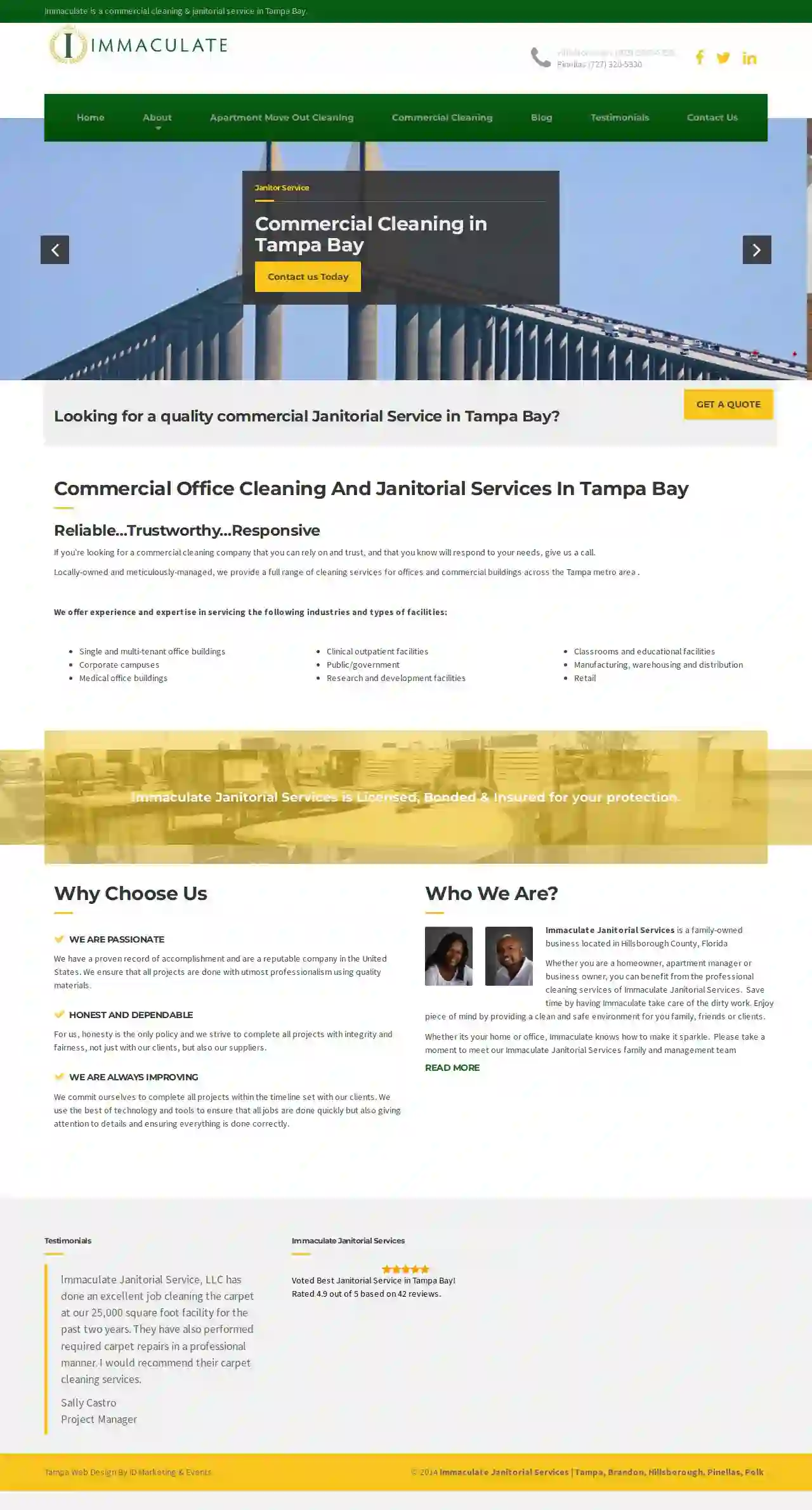Cleaning Services North Palm Beach
Top Local Cleaners in North Palm Beach
Get 3 FREE Residential Cleaning quotes for your project today! Compare profiles, reviews, accreditations, portfolio, etc... and choose the best service.

DC Service Cleaning
55 reviewsCape Coral, US- Services
- Why Us?
- Gallery
Get Quote
Miami White Glove, LLC
51 reviews123 Main St, Miami, 33101, USAt Miami White Glove, we pride ourselves on being the go-to cleaning and organization experts in South Florida. With years of experience in the industry, our team is dedicated to providing top-notch services that cater to the unique needs of each client. From residential cleaning and organization to commercial cleaning and move-in/move-out services, we strive to deliver exceptional results that exceed our clients' expectations. Our mission is to provide a cleaner, healthier, and more organized living and working space for our clients. We achieve this by using eco-friendly products, state-of-the-art equipment, and a team of highly trained professionals who are passionate about what they do.
- Services
- Why Us?
- Accreditations
- Our Team
- Testimonials
Get Quote
Daffodils cleaning service
529 reviewsCape Coral, USDaffodils Cleaning Service is a dedicated cleaning service provider that aims to deliver top-notch cleaning solutions to its clients. With a strong commitment to quality and customer satisfaction, the company strives to make every home and office a clean and comfortable space. Their team of experienced professionals is equipped with the latest cleaning techniques and eco-friendly products to ensure a sparkling clean environment.
- Services
- Why Us?
Get Quote
We Clean SWFL
59 reviews1234 SW Pine Island Rd, Fort Myers, 33901, USWe Clean SWFL is a professional cleaning service specializing in residential and commercial cleaning. Our mission is to provide top-notch cleaning solutions tailored to meet the unique needs of our clients. With a team of experienced professionals, we strive to deliver exceptional service and ensure customer satisfaction. We are fully insured and accredited, ensuring peace of mind for our clients. Our services include one-time, weekly, bi-weekly, and monthly cleaning options, as well as move-in/move-out, construction cleanup, and special event cleaning. We serve various cities in SWFL, including Fort Myers, Cape Coral, and Naples.
- Services
- Why Us?
- Accreditations
- Our Team
- Testimonials
Get Quote
K & C Master Cleaning Inc
512 reviews123 Clean Street, CleanCity, 12345, USK & C Master Cleaning is a professional cleaning service dedicated to providing top-notch cleaning solutions to residential and commercial clients. With a strong commitment to quality, customer satisfaction, and environmental sustainability, the company strives to make every space clean, safe, and healthy. Their team of experienced professionals uses eco-friendly products and state-of-the-art equipment to ensure exceptional results.
- Services
- Why Us?
- Accreditations
- Our Team
- Testimonials
Get Quote
Victory KDD Commercial Cleaning
521 reviewsSouthwest Florida, USVictory KDD Commercial Cleaning is a family-owned and operated company with over 30 years of cleaning and exceptional customer service experience. We are dedicated to exceeding the expectations of all client needs and providing our assistance in adding value to businesses and residential homes alike. Victory partners with top professional chemical providers and cleaning consultants to ensure that we are consistently using the right procedures and cleaners for each and every job that we perform on. Since our founding, Victory KDD are known for quality service, exceptional efficiency, and have always been held at the highest level of professionalism. No matter what you need taken care of, we will exceed all of your cleaning and customer service expectations.
- Services
- Why Us?
- Accreditations
- Testimonials
- Gallery
Get Quote
Cleaning Miami Florida llc
512 reviewsMiami, US- Services
- Why Us?
- Gallery
Get Quote
G & G Commercial Solutions, Inc
52 reviewsSuite 100, 123 Main St, Anytown, 12345, USAt G&G Commercial, we pride ourselves on being a trusted and experienced commercial real estate company. With a proven track record of delivering exceptional results, our team of experts is dedicated to providing personalized service and tailored solutions to meet the unique needs of our clients. From property management to sales and leasing, we have the knowledge and expertise to navigate the complex world of commercial real estate. Our commitment to excellence, integrity, and customer satisfaction has earned us a reputation as one of the top commercial real estate companies in the industry. Whether you're a seasoned investor or a first-time buyer, we invite you to experience the G&G Commercial difference.
- Services
- Why Us?
- Accreditations
- Our Team
- Testimonials
Get Quote
Immaculate Janitorial Service, LLC
52 reviewsTampa, US- Services
- Why Us?
Get Quote
Florida Elite Cleaning Pros
56 reviewsMiami, US- Services
- Why Us?
Get Quote
Over 60,241+ Janitorial Services onboarded
Our cleaning pros operate in North Palm Beach and surrounding areas!
CleaningMatch has curated and vetted the Best Janitorial Companies near North Palm Beach. Find the most trustworthy business today.
Frequently Asked Questions About Cleaning Services
- Using the wrong cleaning products: Certain cleaning products are unsuitable for specific surfaces. Using abrasive cleaners on delicate surfaces can cause scratches or discoloration.
- Not reading product instructions: Always read and follow the instructions on cleaning products to ensure proper usage and avoid potential hazards.
- Using dirty cleaning tools: Dirty cloths, sponges, and mops can spread germs and dirt instead of cleaning them. Rinse and sanitize your cleaning tools regularly.
- Skipping ventilation: Proper ventilation is essential when using cleaning products, especially those with strong fumes. Open windows and doors to allow fresh air circulation.
- Not allowing sufficient drying time: After cleaning, allow surfaces to dry completely to prevent mold and mildew growth, particularly in humid areas like bathrooms.
- Ignoring clutter: Clutter makes cleaning more difficult and time-consuming. Declutter regularly to maintain a cleaner and more organized home.
- Regular Sweeping or Dust Mopping: Sweep or dust mop hardwood floors daily to remove dust, dirt, and debris.
- Vacuuming: Vacuum hardwood floors weekly using a vacuum cleaner with a hardwood floor attachment to avoid scratches.
- Damp Mopping: Damp mop hardwood floors with a hardwood floor cleaner as needed. Avoid excessive water, as it can damage the wood.
- Prevent Scratches: Place felt pads under furniture legs to prevent scratches. Avoid dragging heavy objects across the floor.
- Avoid Harsh Cleaners: Do not use harsh chemicals, abrasive cleaners, or furniture polish on hardwood floors.
- Professional Cleaning: Consider hiring a professional hardwood floor cleaning service for deep cleaning and refinishing as needed.
- Declutter first: Before cleaning, declutter surfaces and remove any items that don't belong. This makes cleaning easier and prevents distractions.
- Gather your supplies: Assemble all your cleaning supplies, including cleaners, cloths, sponges, and a trash bag, in a caddy or bucket to avoid wasting time searching for them.
- Work from top to bottom: Start cleaning from the top of each room and work your way down to prevent dust and debris from falling on already cleaned surfaces.
- Focus on high-traffic areas: Pay extra attention to high-traffic areas like kitchens and bathrooms, where dirt and germs accumulate quickly.
- Use the right tools: Utilize appropriate cleaning tools for different surfaces and tasks. Microfiber cloths are effective for dusting and cleaning glass, while scrub brushes are ideal for tough stains.
- Clean in sections: Break down larger tasks into smaller sections to avoid feeling overwhelmed. Focus on one area at a time before moving on to the next.
- Establish a routine: Create a regular cleaning schedule and stick to it. This prevents dirt buildup and makes cleaning more manageable.
- Check Fabric Care Label: Always check the upholstery care label for cleaning instructions specific to the fabric. Some fabrics may require professional cleaning.
- Vacuum: Vacuum the upholstery thoroughly to remove dust and loose debris. Use a brush attachment for crevices and seams.
- Spot Cleaning: For stains, blot with a clean cloth or sponge. Avoid rubbing, as it can spread the stain. Use a mild upholstery cleaner or a homemade solution of water and mild dish soap.
- Upholstery Cleaning Machine: If the fabric is suitable for wet cleaning, you can use an upholstery cleaning machine. Follow the machine's instructions carefully and test a small, hidden area first.
- Professional Upholstery Cleaning: For delicate fabrics, deep cleaning, or stubborn stains, consider hiring a professional upholstery cleaning service. They have specialized knowledge and equipment to clean upholstery safely and effectively.
What are some common cleaning mistakes to avoid?
By avoiding these common cleaning mistakes, you can improve your cleaning efficiency and achieve better results.
What are some tips for cleaning hardwood floors?
By following these tips, you can keep your hardwood floors looking beautiful for years to come.
What are some tips for cleaning my own home efficiently?
By implementing these strategies, you can clean your home more efficiently and maintain a cleaner and healthier living space.
How do I clean upholstery without damaging the fabric?
Always test any cleaning solution on a small, inconspicuous area first to avoid discoloration or damage.
What are some common cleaning mistakes to avoid?
- Using the wrong cleaning products: Certain cleaning products are unsuitable for specific surfaces. Using abrasive cleaners on delicate surfaces can cause scratches or discoloration.
- Not reading product instructions: Always read and follow the instructions on cleaning products to ensure proper usage and avoid potential hazards.
- Using dirty cleaning tools: Dirty cloths, sponges, and mops can spread germs and dirt instead of cleaning them. Rinse and sanitize your cleaning tools regularly.
- Skipping ventilation: Proper ventilation is essential when using cleaning products, especially those with strong fumes. Open windows and doors to allow fresh air circulation.
- Not allowing sufficient drying time: After cleaning, allow surfaces to dry completely to prevent mold and mildew growth, particularly in humid areas like bathrooms.
- Ignoring clutter: Clutter makes cleaning more difficult and time-consuming. Declutter regularly to maintain a cleaner and more organized home.
By avoiding these common cleaning mistakes, you can improve your cleaning efficiency and achieve better results.
What are some tips for cleaning hardwood floors?
- Regular Sweeping or Dust Mopping: Sweep or dust mop hardwood floors daily to remove dust, dirt, and debris.
- Vacuuming: Vacuum hardwood floors weekly using a vacuum cleaner with a hardwood floor attachment to avoid scratches.
- Damp Mopping: Damp mop hardwood floors with a hardwood floor cleaner as needed. Avoid excessive water, as it can damage the wood.
- Prevent Scratches: Place felt pads under furniture legs to prevent scratches. Avoid dragging heavy objects across the floor.
- Avoid Harsh Cleaners: Do not use harsh chemicals, abrasive cleaners, or furniture polish on hardwood floors.
- Professional Cleaning: Consider hiring a professional hardwood floor cleaning service for deep cleaning and refinishing as needed.
By following these tips, you can keep your hardwood floors looking beautiful for years to come.
What are some tips for cleaning my own home efficiently?
- Declutter first: Before cleaning, declutter surfaces and remove any items that don't belong. This makes cleaning easier and prevents distractions.
- Gather your supplies: Assemble all your cleaning supplies, including cleaners, cloths, sponges, and a trash bag, in a caddy or bucket to avoid wasting time searching for them.
- Work from top to bottom: Start cleaning from the top of each room and work your way down to prevent dust and debris from falling on already cleaned surfaces.
- Focus on high-traffic areas: Pay extra attention to high-traffic areas like kitchens and bathrooms, where dirt and germs accumulate quickly.
- Use the right tools: Utilize appropriate cleaning tools for different surfaces and tasks. Microfiber cloths are effective for dusting and cleaning glass, while scrub brushes are ideal for tough stains.
- Clean in sections: Break down larger tasks into smaller sections to avoid feeling overwhelmed. Focus on one area at a time before moving on to the next.
- Establish a routine: Create a regular cleaning schedule and stick to it. This prevents dirt buildup and makes cleaning more manageable.
By implementing these strategies, you can clean your home more efficiently and maintain a cleaner and healthier living space.
How do I clean upholstery without damaging the fabric?
- Check Fabric Care Label: Always check the upholstery care label for cleaning instructions specific to the fabric. Some fabrics may require professional cleaning.
- Vacuum: Vacuum the upholstery thoroughly to remove dust and loose debris. Use a brush attachment for crevices and seams.
- Spot Cleaning: For stains, blot with a clean cloth or sponge. Avoid rubbing, as it can spread the stain. Use a mild upholstery cleaner or a homemade solution of water and mild dish soap.
- Upholstery Cleaning Machine: If the fabric is suitable for wet cleaning, you can use an upholstery cleaning machine. Follow the machine's instructions carefully and test a small, hidden area first.
- Professional Upholstery Cleaning: For delicate fabrics, deep cleaning, or stubborn stains, consider hiring a professional upholstery cleaning service. They have specialized knowledge and equipment to clean upholstery safely and effectively.
Always test any cleaning solution on a small, inconspicuous area first to avoid discoloration or damage.